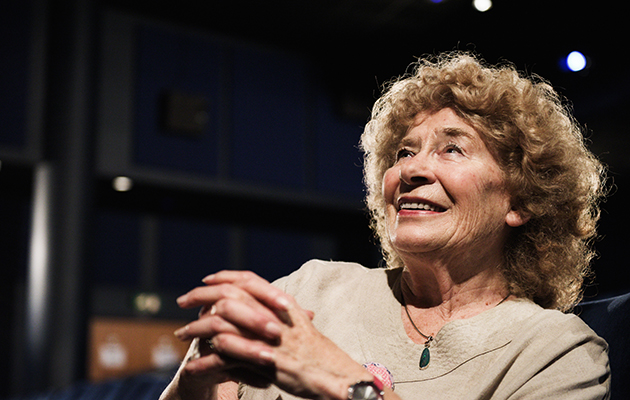SHIRLEY COLLINS
THE POWER OF THE TRUE LOVE KNOT
POLYDOR, 1968
Produced by an unenthusiastic Joe Boyd and featuring The Incredible String Band, this remains one of Collins’ finest collections
This is my first album to feature The Instrument – it’s got a Victorian banjo neck, and a beautiful, slightly heart-shaped dulcimer body. Mike [Heron] and Robin [Williamson] from The Incredible String Band were on this, playing chanter, hand drums, clapping. They were so lovely and funny to have around, and I loved their music. They were hippies, I know, but there was a lot of genuine wisdom about it as well. I didn’t intend to have them on the album, but Joe Boyd, who produced it, didn’t like my singing very much – I remember him saying, “Give it a bit more drama…” “No, Joe, it’s not what I do.” He really wanted me to be Sandy Denny, but I wasn’t. He brought the Incredibles in to make it a bit more lively, and it certainly worked. It made the whole recording process absolutely delightful. I was still picking up songs from anywhere then, mostly from books. “Lady Margaret And Sweet William” is a fantastic song. It’s so cruel! It’s the way some of these songs are set up that enthrals me still. The majesty and the power of the words, a direct line into your heart and your brain. Nobody can write stuff like it. I don’t think Joe Boyd liked this album even when it was done, because he didn’t give it a mention in his book White Bicycles, which was a bit silly of him. But you can’t please everyone.
___________________
SHIRLEY & DOLLY COLLINS
ANTHEMS IN EDEN
HARVEST, 1969
Dolly and Shirley team up with the Early Music Consort for this earthy suite of folk songs
I used to make fun of the older, middle-class ladies at Cecil Sharp House who used to go country dancing, until John said to me one day, “Don’t you think that those women are possibly the ones who lost their sweethearts or husbands in the First World War?” And yes, he was right. And then he wrote “The Whitsun Dance”, and I think because that refers to Sussex it just gave me a feeling – I knew where I really belonged. That was the turning point where I realised it was important for me to not only be an English singer, but also a Southern English one. This influenced me when we put a suite of songs together for Anthems In Eden, though I’m not sure we thought of it as a suite when we started. The important thing was to start thinking England, and championing English music. I love early music and I like the roughness of those instruments – they can be tender and gentle, but there’s also strength too. Once we’d met [EMC co-founder] David Munrow, the proposal was that we work together. It was marvellous for Dolly – she wasn’t just writing a keyboard arrangement, she was writing for all these instruments, so I think that gave her a lot of fulfilment. Dear old Dolly, she was always quite retiring, but I think this gave her such a sense of achievement. It was a great album to make as well. Although the whole concept of Anthems In Eden, as if England was a paradise, is not something you can believe in, there’s something in this music that just binds me to England. You can truly say that these songs are centuries old and wonderful for it. Oh, that picture of us with the ram is lovely! It was made by Mike Clifton of Chingford Morris, which became Albion Morris. That picture was taken at the Woburn Festival, and Jimi Hendrix was on the same bill. I always loved his work! I met him a couple of years later – he came out to the house in Blackheath one day, and he was so utterly charming. He took my daughter Polly on his knee, and I still have this image of her gazing raptly up at his face. I saw him once in concert and I was really worried, because he played his guitar with his teeth – I was thinking, ‘Don’t do that!’
___________________
SHIRLEY & DOLLY COLLINS
LOVE, DEATH & THE LADY
HARVEST, 1970
Splitting from her husband, Shirley crafts this dark, sparse follow-up to Anthems In Eden
John and I were drifting apart, partly because he liked jazz so much. Seriously! He used to insist on playing jazz albums and I was so angry about it – I once threw two full coffee cups at the wall in a rage! One night he brought home a young jazz musician who was a drug addict, and wanted to put him up for a few days. I didn’t want to, as it was such a small house and we had two kids. One night I was there on my own and there was a knock at the door, and there were these two south London heavies, minicab drivers, who wanted the money that this man had been building up by not paying the fares. So I gave them a cheque, but that was it; I just thought, ‘No, I can’t have this.’ John apologised to his friend when he was kicked out, but he didn’t apologise to me, so that was the death-knell for our marriage in a way. I wasn’t happy, [so] these songs are quite dark, and sad. “Polly On The Shore” is a Sussex song for sure, and that came from George Maynard – it’s one of the great songs, I think. “The Plains Of Waterloo” is one of the greats, too. “Death And The Lady” is one of Dolly’s great arrangements. These songs show the depth of the English tradition too, how it encompasses absolutely everything – you can’t say that it’s folderol music, which a lot of people think it is.



